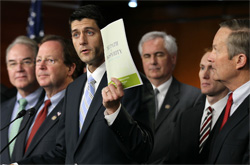Republican Paul Ryan's budget proposal is brave, radical, and smart.
Posted Tuesday, April 5, 2011, at 6:09 PM ET For the past 30 years, Republicans have been hypocrites about spending. They've raged against big government without ever proposing the kinds of cuts necessary to bring federal expenditures in line with tax revenues. Democrats have been more fiscally responsible, producing an actual budget surplus during Bill Clinton's second term. But they've been little better than Republicans when it comes to confronting the nation's long-term fiscal imbalance, which is driven by the projected growth in entitlement spending.
For the past 30 years, Republicans have been hypocrites about spending. They've raged against big government without ever proposing the kinds of cuts necessary to bring federal expenditures in line with tax revenues. Democrats have been more fiscally responsible, producing an actual budget surplus during Bill Clinton's second term. But they've been little better than Republicans when it comes to confronting the nation's long-term fiscal imbalance, which is driven by the projected growth in entitlement spending.And before they reject everything in Ryan's plan, liberals might want to consider whether some of what he proposes doesn't in fact serve their own ultimate goals. Ryan's proposal to turn Medicare into a voucher provides an easy political target. But it's hard to make a principled liberal case for the program in its current form. To do so, you have to argue that government-paid health care should be a right only for people over the age of 65, and for no one else. Medicare covers doctor and hospital bills at 100 percent, regardless of income. This gives doctors and patients an incentive to maximize their use of the system and waste public resources. Choosing to pay 100 percent of Warren Buffett's medical bills while cutting Head Start reflects a strange set of social priorities, to say the least.
Ryan's alternative to Medicare hardly seems as terrible as Paul Krugman makes out. Seniors would enter the health care world the rest of us live in, with co-payments, deductibles and managed care. Eventually, cost control would require some tough decisions about end-of-life care and the rationing of high-tech treatments that have limited efficacy. But starting with a value of $15,000 per year, per senior—the amount government now spends on Medicare—Ryan's vouchers should provide excellent coverage. His change would amount to a minor amendment to the social contract, not a fundamental revision of it.
Effectively constraining the growth of Medicare could make it possible for Democrats to do a lot else that's important to them in the future. In 2010, Medicare spending was $519 billion, as compared with $666 billion for all non-defense domestic discretionary spending. Growing at more than 7 percent a year, Medicare is projected to eventually consume nearly all federal tax revenues. It is crowding out everything else that Washington does or might want to do. Conversely, cutting Medicare's growth rate to near the overall rate of the economy would do more than anything else to enable the kind of activist government liberals support—investment in kids, education, jobs, and infrastructure. Ryan's goal isn't to empower the federal government. But if your goal is a more interventionist public sector, you might find yourself on Ryan's side of the Medicare debate.
Of the alternatives we face in controlling long-term spending growth, moving Medicare to a voucher system seems only mildly unfortunate—and nothing as compared with a debt-driven economic crisis that could stem from inaction. As Ryan rightly points out, this kind of crisis could come at any time and could cast a pall over the country's entire future. Keeping Medicare as a fee-for-service program simply isn't worth that risk. If anything, liberals should go further than Ryan did in this plan, adding a means-test that would diminish Medicare subsidies for upper-income beneficiaries.
There are, of course, some sleight-of-hand tricks in Ryan's plan. What he claims would restore fiscal balance would do nothing of the kind over the next decade, leaving $400 billion in annual deficits as far as the eye can see. That's because he slips a large tax cut into his "reform," leaving government revenues perpetually two percentage points lower than spending expenditures as a share of GDP. What's needed is not more tax cuts but a modest tax increase, of the kind the Simpson-Bowles fiscal commission proposed. That failure is easily remedied, however, by adopting a top rate higher than the 25 percent he proposes, though still lower than the current 35 percent level.
Ryan also evades a lot of difficult particulars. He seldom spells out domestic spending cuts, preferring to kick the can down the road by applying "caps." He skirts the question of which deductions and tax subsidies he'd eliminate to pay for these lower rates. Unfortunately, you don't get big savings unless you eliminate mortgage interest and charitable deductions, which would be politically unpopular. Ryan includes the Heritage Foundation's projections about job growth triggered by his plan—4 percent unemployment in 2015 vs. 5.9 percent without the plan—that are a supply-side fantasy. His anti-bailout rhetoric is silly pandering. I could go on.
But more than anyone else in politics, Rep. Ryan has made a serious attempt to grapple with the long-term fiscal issue the country faces. He has a largely coherent, workable set of answers. If you don't like them, now you need to come up with something better.
No comments:
Post a Comment